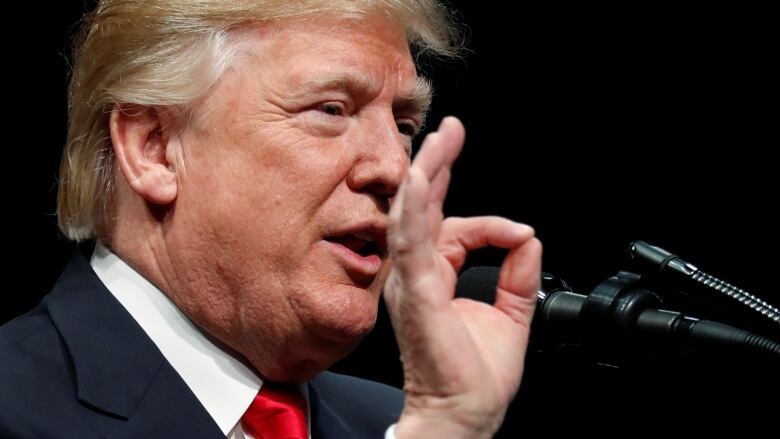Making sense of President Trump's attacks on the FBI: Keith Boag
Historian says Trump has 'never really tried to understand why people do things that are not in his interest'

For a split second it seemed Donald Trump might be coming around on the FBI's probe into Russia's election meddling and that he was almost ready to acceptthere might, in fact, be a real point to it.
On the Sunday after the FBI indicted 13 Russians on a range of charges related to the 2016 presidential election, Trump tweeted, "It was the GOAL of Russia to create discord, disruption and chaos within the U.S." precisely what everyone in the intelligence community and even his own White House has been trying to get him to understand for more than a year.
But then he finished the thought by again blaming American political institutions for Russia's success in stirring things up: "With all of the Committee Hearings, Investigations and Party hatred, [the Russians]have succeeded beyond their wildest dreams. They are laughing their asses off in Moscow. Get smart America!"
He's probably right the Russians are delighted the investigations into their election meddling are taking up so much space and causing so much argument in the U.S.'s political life. But Trump's "Get smart America!" scold suggests he also thinks it might be better if everyone just looked the other way and let the Russia thing slide.
It all amounts to a long stretch of bad public relations for the FBI.

It's odd for the bureau to find itself publicly on the opposite side of an argument with a Republican president about Russians. Normally the Republicans enjoy posing as defenders of law and order and being conspicuously standoffish about their rivals in the former Soviet Union.
"Yeah that bugs me," said Robert Anderson, a former assistant director of the FBI's cyber branch, when askedabout how much more harshly Trump speaks of the FBI than he does of Russian espionage.
"I don't think he has a true picture of Vladimir Putin," he said."But make no bones about it: Vladimir Putin and the Russian machine are not friends of the U.S. Especially when it comes to counter-intelligence and espionage activities. Not at all."
A U.S. president is supposed to know all that and, really, it defies belief that Trump does not.
He could be putting on an act. Pitting himself against the FBI goes with the flow of the made-for-TV political character Trump invented long before the election: he is the great disruptor; the swamp-draining, establishment-shamingdestroyer of the alleged Deep State. It makes a kind of political sense that such a character would choose the FBI as an enemy.
'No collusion!'
New York University historian Timothy Naftali, who directed the Nixon presidential library's revision of its originally fanciful presentation of the Watergate scandal, has a simpler explanation for Trump's hostility to the FBI.
"The president has never really tried to understand why people do things that are not in his interest," he says.
Republicans and the president deny there is self-interest in their critique of the FBI's handling of the Russia case. They are disdainful of suggestionsinvestigators will find any collusion between the president's election campaign and Putin'sdirty tricks campaign. They ascribe such notions to the hysteria of Democrats and coastal media elites.
"No collusion!" the president has said what seems like at leasta million times. And indeed, even the evidence the Trump campaign was eager to get dirt from Russians about rival Hillary Clinton before the election shows they may have been too inept to succeed.
But if there was no collusion, then what is the problem? The FBI's own behaviour during the election the handling or mishandling of investigations into Clinton's use of a private email server while secretary of state seems to have been one of the more important factors that tipped a squeaker election in Trump's favour.

Given that, why so much hostility from Trump toward the FBI now?
In the indictments special counsel Robert Mueller has brought forward so far there are clues about money laundering, tax evasion, shady dealings with Ukraine and so on, none of which are directly related to Trump.
But what we have not yet got to, and we know interests Mueller, is the simple and straightforward question that has hung over all of the suggestions about Trump-Russia connections for a very long time: Why have Trump, his son, his advisersand othersall lied about it?
It is the thing most difficult for Trump's defenders to explain because, we must assume, they don't know the answer themselves.
It's true there is a measure of liberal hysteria about Trump and the collusion question.
But there is also the fact that when news first broke that Trump's son and members of the campaign team had met with Russians at Trump Tower during the election explicitly to get dirt on Clinton, the Trump team concocted a story that the meeting was about something else and issued a statement they knew to be untrue.
They lied. And the White House admits the president had a role in stickhandling that.
The answer to why they lied might also explain why the president has so deliberately persisted in trying to blacken the reputations of those investigating the question.












_(720p).jpg)


 OFFICIAL HD MUSIC VIDEO.jpg)
.jpg)



























































































